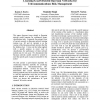Free Online Productivity Tools
i2Speak
i2Symbol
i2OCR
iTex2Img
iWeb2Print
iWeb2Shot
i2Type
iPdf2Split
iPdf2Merge
i2Bopomofo
i2Arabic
i2Style
i2Image
i2PDF
iLatex2Rtf
Sci2ools
103
click to vote
ICML
1996
IEEE
1996
IEEE
Learning Goal Oriented Bayesian Networks for Telecommunications Risk Management
This paper discusses issues related to Bayesian network model learning for unbalanced binary classification tasks. In general, the primary focus of current research on Bayesian network learning systems (e.g., K2 and its variants) is on the creation of the Bayesian network structure that fits the database best. It turns out that when applied with a specific purpose in mind, such as classification, the performance of these network models may be very poor. We demonstrate that Bayesian network models should be created to meet the specific goal or purpose intended for the model. We first present a goal-oriented algorithm for constructing Bayesian networks for predicting uncollectibles in telecommunications riskmanagement datasets. Second, we argue and demonstrate that current Bayesian network learning methods may fail to perform satisfactorily in real life applications since they do not learn models tailored to a specific goal or purpose. Third, we discuss the performance of "goal ori...
Bayesian Network | Bayesian Network Models | Current Bayesian Network | ICML 1996 | Machine Learning |
| Added | 17 Nov 2009 |
| Updated | 17 Nov 2009 |
| Type | Conference |
| Year | 1996 |
| Where | ICML |
| Authors | Kazuo J. Ezawa, Moninder Singh, Steven W. Norton |
Comments (0)

